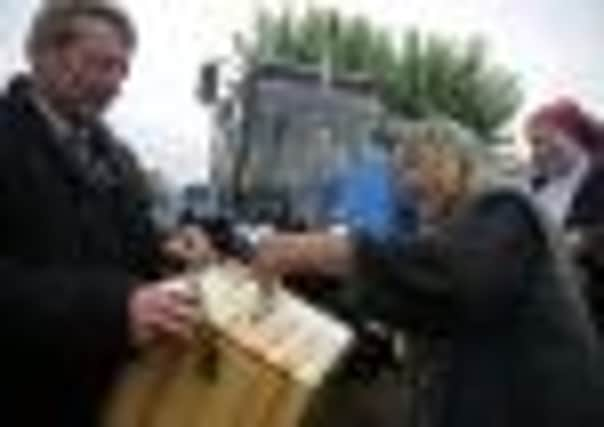Opposition in Belarus bows out of ‘flawed’ poll


The election is to fill 110 seats in parliament, which long has been reduced to a rubber stamp by authoritarian president Alexander Lukashenko, who has ruled the former Soviet nation since 1994. Observers have criticised all recent elections in Belarus as undemocratic.
Mr Lukashenko’s landslide win in the 2010 presidential election triggered a mass street protest that was brutally suppressed, and any rallies after the current parliamentary vote would be certain to draw a similar harsh response.
Advertisement
Hide AdAdvertisement
Hide Ad“Elections in those states where they are boring and peaceful are a good thing for the people, not to mention for the government,” Mr Lukashenko said after casting his ballot. But he warned that the calm would not last if the opposition mounted a protest.
“The main show here, as you understand, always begins after the elections, therefore anything can happen, although of course, God forbid that it does,” he said.
The opposition had hoped to use this election to build support, but 33 out of 35 candidates from the United Civil Party were barred from television, while the state-owned press refused to publish their election programs.
“We are calling on voters to ... ignore and boycott this electoral farce,” said party leader Anatoly Lebedko. The other party that boycotted the vote was the Belarusian Popular Front. About 40 candidates from communist and leftist groups critical of Mr Lukashenko still ran, but are not expected to do well.
“Mr Lukashenko has made the situation totally absurd, not even bothering to put a democratic facade on it,” said Vitaly Rymashevsky, who ran against Mr Lukashenko in the 2010 presidential election. “He already knows the names of the new parliament members.”
The president has said the opposition parties’ withdrawal from the vote reflects their weakness and shows they “are nobodies”.
This judgment has been accepted by voters like Pyotr Rushailo, a 73-year-old retired military officer.
“I am sure that the people will support the government and we will get through our current difficulties,” he said. “The opposition only disrupts the normal work of the president and parliament, so I’m glad they are not taking part in the elections.”
Advertisement
Hide AdAdvertisement
Hide AdThe United States and the European Union have imposed economic and travel sanctions on the Belarusian government over its crackdown on opposition groups and independent news media.
The Organization for Security and Co-operation in Europe has fielded 330 observers for yesterday’s vote, but two monitors from the OSCE’s parliamentary assembly were denied entry to Belarus without explanation.
About 28 per cent of eligible voters had cast their ballots during the week ahead of the election, taking part in early voting that was strongly promoted by the authorities. Ballot boxes stood unguarded at polling stations for days, which observers described as a source of potential fraud.
“They compiled lists of those who took part in the early voting and may punish those who disobeyed,” said student Roman Gubarevich who voted Wednesday. Police arrested about 700 people after the last election protests. Some are still in jail, including presidential candidate Nikolai Stankevich.